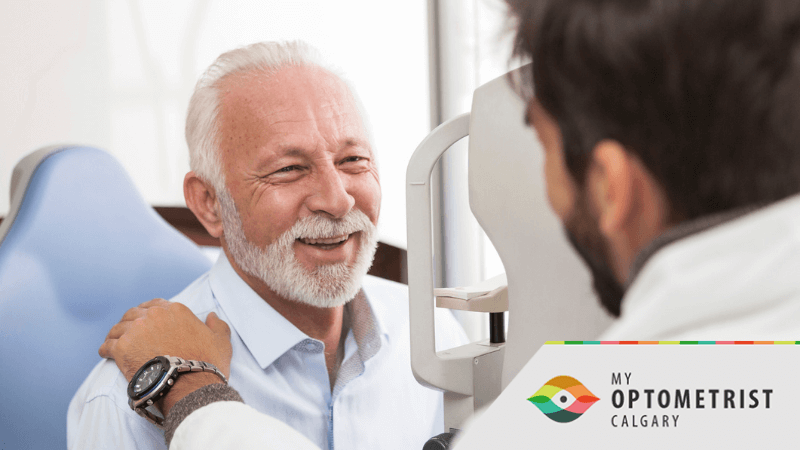
Sight is the most powerful of our senses and it is believed that about 80% of what we perceive of the world around us comes from sight. Because so many people rely on their sight, it is important to take the steps you can now to prevent vision damage in the future and to relieve any symptoms you may currently be experiencing. The best way to care for your eye health is to have your eyes professionally examined by an optometrist and to stay educated about general eye health and eye health concerns specific to you. Knowing your own eye health and having honest discussions with your optometrist will help you see better for longer.
Questions For Your Eye Doctor
1. How Can I Improve My Eye Health?
This may seem like an obvious question but it’s a good way to show your interest and to open a dialogue about eye health specific to you. While there are general ways to improve eye health, such as eating well, protecting your eyes from UV, and sleeping enough, after your comprehensive eye exam there may be specific steps for you to take that will improve your overall eye health, especially if you have a family history of eye conditions.
2. How Can I Fight Digital Eye Strain?
As more people are on their smart devices for long periods, digital eye strain has become incredibly common. Symptoms include headaches, blurry vision, dry eyes, eye strain, and sometimes double vision. If you are experiencing any of these symptoms, relay them to your eye doctor. They may recommend blue light blocking glasses or resting your eyes, or they may offer a more tailored solution, including checking for other eye conditions that can cause these symptoms.
3. What Are My Options For Vision Correction?
While glasses are the most common way of correcting vision there are other options. You can get contacts or LASIK eye surgery, but you will need to make sure you are eligible. For contact lenses, you will need to make sure you are not allergic to the material of the contacts, although this is rare. For LASIK, your optometrist will need to make sure you have sufficient cornea thickness for surgery and that you meet the other qualifications. You can also discuss pricing and long-term benefits with the optometrist and office staff.
4. How Can I Protect My Eyes?
Preventative eye care is the best way to keep your eyes healthy in the future. You’re already helping your eye health by visiting the eye doctor in the first place, but there may be more you can do. Make sure to discuss how frequently you wear sunglasses and if they are UV blocking, as well as your health habits, such as smoking. You can also discuss proper contact lens cleaning or protective eyewear if you play a sport or work in construction and see what prescription eyewear options you have.
5. When Should I Schedule My Next Eye Exam?
While most adults schedule their eye exams every 2 years, the frequency of appointments will depend on your age, your eye health, your general health, or any expected changes to your body (such as pregnancy or menopause). Your optometrist will be able to give you a recommendation by taking all of these into consideration.
Discuss With Our Calgary And Three Hills Optometrists
Taking care of your eye health is an ongoing task and having engaging conversations with your optometrist is a great way to ensure that you’re doing what you can to prolong healthy vision. To ask your eye doctor any of the questions above, you will first need to schedule a comprehensive eye exam. At My Optometrist in Calgary and Three Hills, our optometrists and our staff are happy to answer your questions and educate you about eye health! To book an eye exam with one of our optometrists, contact My Optometrist at one of our three locations, either Health First in SE Calgary, Sunridge in NE Calgary, or Three Hills, AB. You can also call us or fill out the online contact form.
FAQ
Q: What happens at an eye exam?
A: A comprehensive adult eye exam (for those between 19 and 64 years of age) at My Optometrist Calgary includes:
- A review of your past and present eye and general health issues, as well as your family history.
- A discussion of your visual needs at work or school, at home, and for leisure.
- Measurement of your current level of vision with and without your glasses or contact lenses, and determination of your prescription.
- Assessment of your ability to move and use both eyes together.
- Measurement of the pressure inside of your eyes.
- A visual field assessment to measure your peripheral vision
- Careful examination of the health of your eyes inside and outside. Drops to dilate your pupils may be recommended and administered.
- A photograph of the back of your eyes.
Q: Is there a difference between a vision test and an eye exam
A: Yes. A vision test can be done by a trained screener and does not require an optometrist or ophthalmologist to conduct the test. Vision tests only determine what prescription you may need for lenses and do not look at any other aspects of your eye health. A comprehensive eye exam can only be performed by an optometrist or ophthalmologist and evaluates both the internal and external parts of the eye to detect common eye diseases like glaucoma.
Q: Do comprehensive eye exams hurt?
A: No, they do not. The tests that are conducted are non-intrusive and will not cause any pain. If for some reason you experience any pain or discomfort during the exam, let your optometrist know right away.